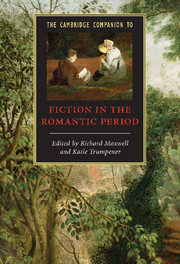Book contents
- Frontmatter
- Introduction
- 1 The historiography of fiction in the Romantic period
- 2 Publishing, authorship, and reading
- 3 Gothic fiction
- 4 The historical novel
- 5 Thinking locally: novelistic worlds in provincial fiction
- 6 Poetry and the novel
- 7 Orientalism and empire
- 8 Intellectual history and political theory
- 9 Women writers and the woman’s novel: the trope of maternal transmission
- 10 Tales for child readers
- 11 Sentimental fiction
- 12 Fiction and the working classes
- 13 The Irish novel 1800-1829
- 14 Scotland and the novel
- Further reading
- Index
- Series List
9 - Women writers and the woman’s novel: the trope of maternal transmission
Published online by Cambridge University Press: 28 January 2009
- Frontmatter
- Introduction
- 1 The historiography of fiction in the Romantic period
- 2 Publishing, authorship, and reading
- 3 Gothic fiction
- 4 The historical novel
- 5 Thinking locally: novelistic worlds in provincial fiction
- 6 Poetry and the novel
- 7 Orientalism and empire
- 8 Intellectual history and political theory
- 9 Women writers and the woman’s novel: the trope of maternal transmission
- 10 Tales for child readers
- 11 Sentimental fiction
- 12 Fiction and the working classes
- 13 The Irish novel 1800-1829
- 14 Scotland and the novel
- Further reading
- Index
- Series List
Summary
When Catherine Morland of Austen's Northanger Abbey explains to her more experienced and rather arch new friend, Henry Tilney, that she is acquainted with the landscape of southern France only through the pages of Radcliffe's Mysteries of Udolpho, she hastens to add, “But you never read novels, I dare say?” Although she has herself become deeply absorbed in the reading of novels, and of Gothic novels in particular, Catherine anxiously acknowledges to Henry her awareness that such books “are not clever enough for you - gentlemen read better books.” Henry quickly corrects Catherine's assumption; but Catherine's generalization, deprecating both to women and to novels, is founded not only on an earlier conversational rebuff by the rude John Thorpe but also on a commonplace of eighteenth-century culture: novel-reading is for women. The first literary history of the genre, published in 1785 by a woman novelist, Clara Reeve, reflects this commonplace, presenting its history of “the progress of romance” and of its offspring, the novel, through a debate between a female defender, Euphrasia, and a male opponent, Hortensius, who explains that it is in fact for women's sake that he wishes to ban such books: members of the female sex “are most concerned in my remonstrance for they read more of these books than ours, and consequently are most hurt by them.” From Hortensius's point of view, the phrase “the woman's novel” is redundant, with that redundancy conveying a special suitability and therefore susceptibility and therefore danger.
Hortentius's apprehension of novels' special dangers for female readers was nothing new in 1785: in 1712, Addison and Steele had warned women against consuming “Romances, Chocolate, and the like Inflamers”; in 1766, when James Fordyce declared in his Sermons for Young Women that “we consider the general run of Novels as utterly unfit for you . . . They paint scenes of pleasure and passion altogether improper for you to behold, even with the mind's eye,” he was summarizing a familiar view.
- Type
- Chapter
- Information
- The Cambridge Companion to Fiction in the Romantic Period , pp. 159 - 176Publisher: Cambridge University PressPrint publication year: 2008
- 2
- Cited by



